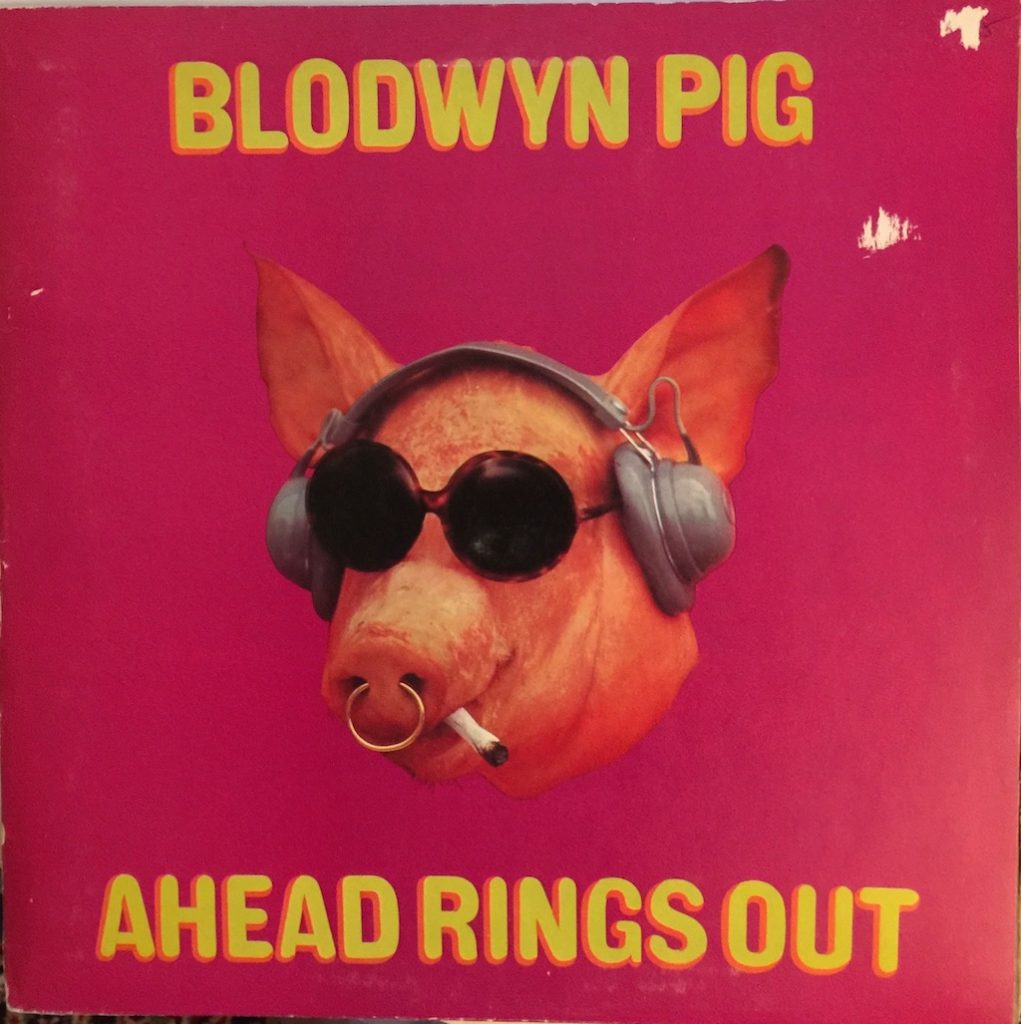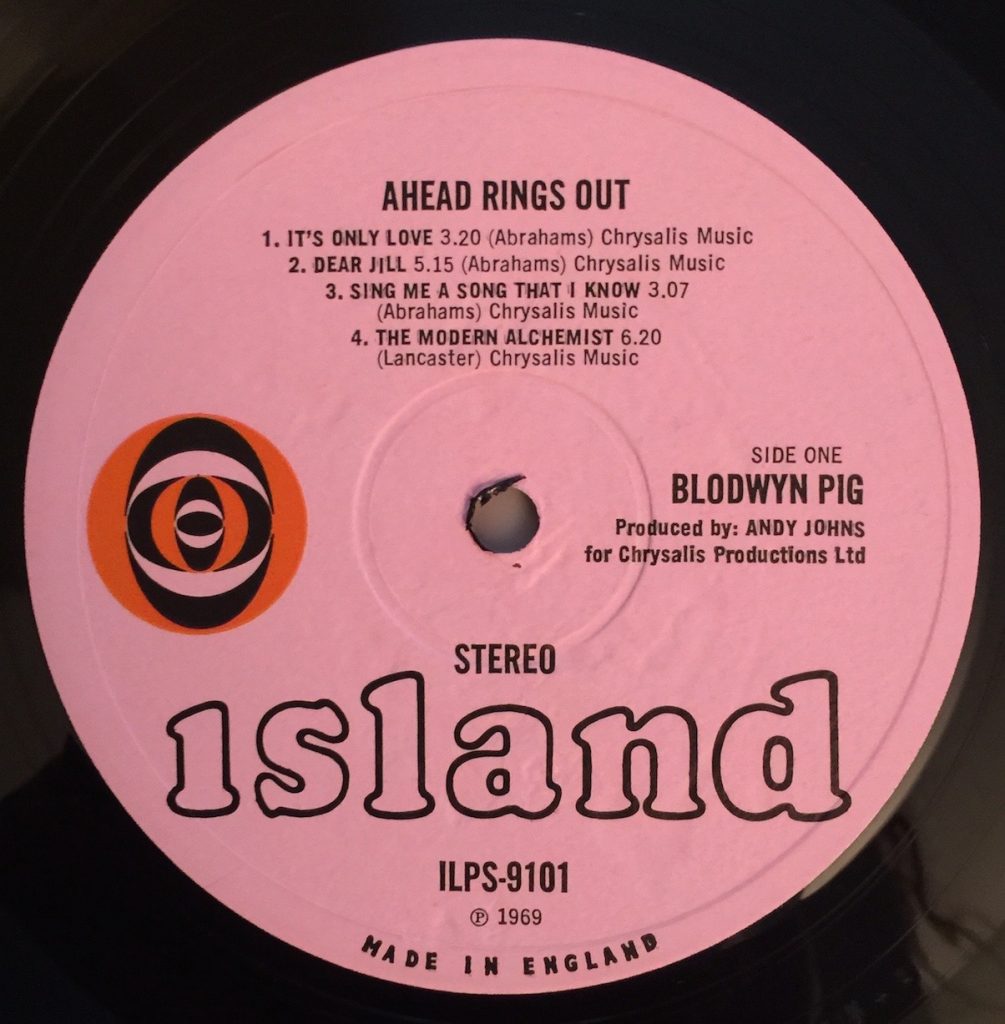
Blodwyn Pig- Ahead Rings Out
On the heels of our recent look at early Jethro Tull, it is worth spending a little virtual ink on Blodwyn Pig’s first album. Tull’s debut, This Was, a blues-drenched mix of hard rock was, in many ways, a “one-off.” Mick Abrahams, Tull’s guitarist left, and the band’s direction on the next album–the seminal Stand Up—and thereafter, was shaped by Ian Anderson. Some Tull fans were disappointed that it didn’t continue as a blues-rock band. I’m not. The common wisdom was that Abrahams wanted to continue in a blues vein and Anderson didn’t. Abrahams formed Blodwyn Pig, and listening to their first album, Ahead Rings Out, one might expect to hear an electric blues album.[1] But, It’s far more jazz than blues-rock, and a very good listen too.
Part of this may be due to the musicianship of horn player Jack Lancaster, who features prominently in the band’s recorded performances. Lancaster was profoundly influenced by Roland Kirk, who he first heard at Ronnie Scott’s in London.[2] Kirk was a sorely underrated woodwind player whose virtuosity was often overshadowed by his onstage antics, including his ability to play multiple horns at once. Kirk’s influence seems to loom large in Blodwyn Pig’s eclectic mix of hard rock, blues and jazz sounds. The band was rounded out by bassist Andy Pyle (The Kinks; Savoy Brown) and drummer Ron Berg.
The album starts with “It’s Only Love,” a rollicking big band “trad” sound- yes, it’s a blues, but it’s far more New Orleans than Luton; we laze into the next track, “Dear Jill,” a softer lover’s lament, conjuring up a mix of acoustic ballad and dark, rain-slick urban alleys. The slide parts work nicely and the horns accent, rather than take center stage. “Sing Me a Song I Know” starts at full tilt- it’s rock, but done with a full complement of instruments, including horns (Lancaster must have been busy). The track didn’t grab me, but it may have worked effectively live. The next track, “The Modern Alchemist” has some very cool elements that could fit into any club of post-war jazz- it’s melodic, and though fast-paced, isn’t so experimental that it wanders. The psych-blues guitar that comes in part way through, playing off of standard jazz licks, works great and the song ends with a marvelous interlude of guitar-horn interplay as the full band comes crashing in at the wind-up.
The second side starts with “Up and Coming” a little T-Bone Walker style guitar, mixed with a cool blues rock vocal- the instrumentation is sparse and the song is all about the slow groove. Abrahams shows his stuff here- a classic slow blues lead line that is pretty faultless (and reminds me of Duane Allman’s work in the early days).
“Leave It With Me” is pure jazz poetry- and somewhat reminiscent of early Tull in large part because of the prominence of the flute. These guys are hot on this one- Abrahams’ guitar solo is another classic, and is followed by an outstanding bass solo.
“The Change Song” starts with a spoken word part done in a thick Cockney accent that transitions into an acoustic blues—slide, plucked guitar, and a lyrical vocal part. It’s a mellow gem in spite of the intro, and a sort of disconnected ending that segues into the last track- a bash-fest called “Ain’t Ya Coming Home, Babe?” that seems to throw everything into the mix. It’s the hard rocker of the set, and a pretty good one, but it’s a jumble.
There’s almost nothing about this album that is overtly commercial, but apparently it charted and was well received at the time. Perhaps listeners were more adventurous then. Listening to it today, Ahead Rings Out has some extremely strong moments, but is in some ways a time capsule from an era when experimentation and pushing boundaries were hallmarks of success. It is enduring, partly because of the early Tull connection (there was much lamenting of Abrahams’ departure from Tull) and because some of the tracks still sound fresh today.

My copy is an early Island UK pink label pressing with the orange “bulls-eye.” The record has been reissued intermittently over the years, and even an early Island UK pressing should not put a big dent in your wallet. Andy Johns, who engineered many major albums in this era, produced and engineered.[3]
______________________________________________
[1] The Brits were a profound influence on the genre, not only reviving American blues in a harder rocking mold but also reinventing the form in varied ways, from psychedelic to folk and beyond. This inventiveness, as reflected in Tull’s evolution, also became a wellspring for “progressive” rock.
[2] See Interview with Jack Lancaster, http://dmme.net/interviews/jlancaster.html.
[3] There are some track differences between the US and UK releases- two tracks, “Summer Day” and “See My Way” were not included on the UK release. The latter track shows up on the UK version of the band’s second album, Getting to This.